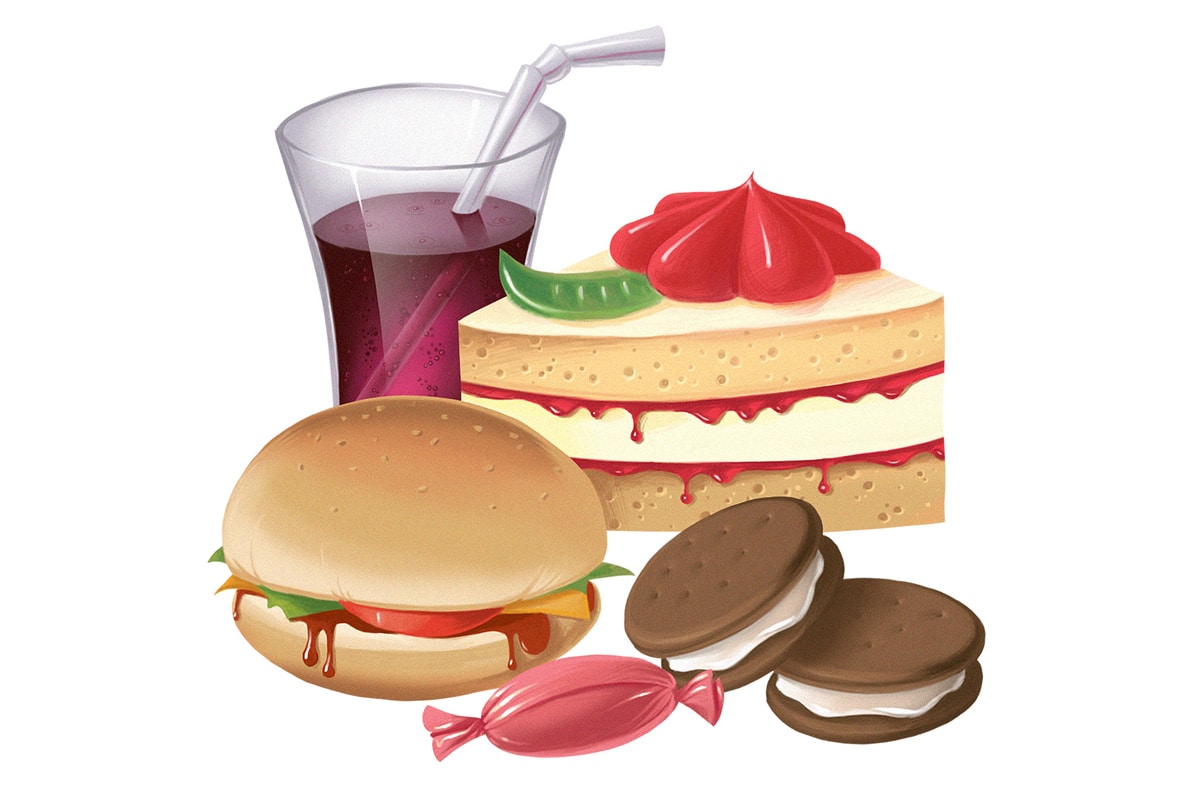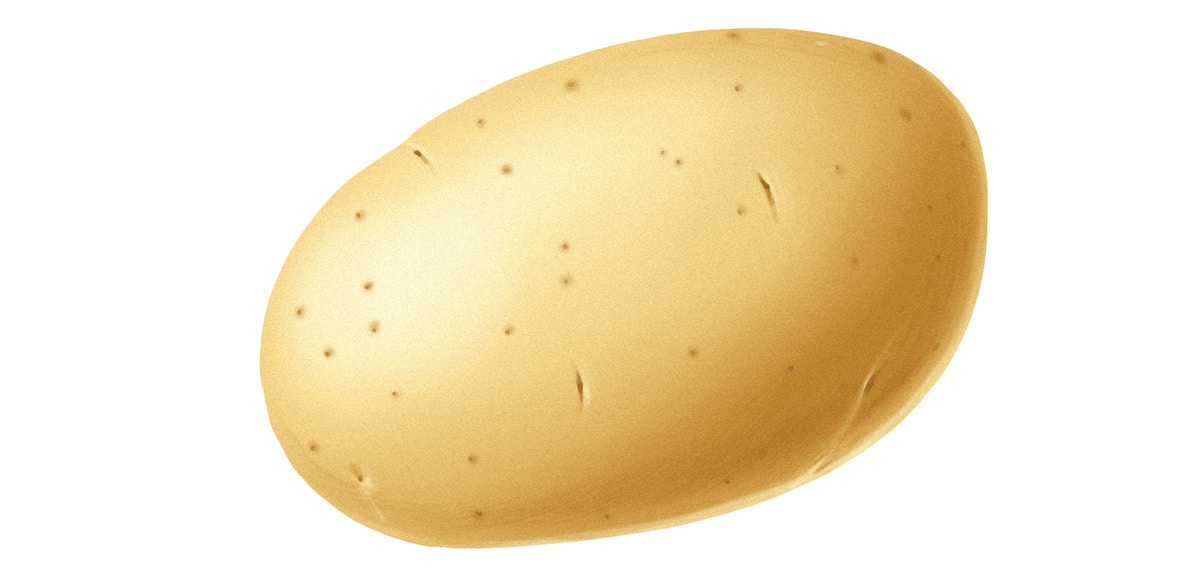What’s your mental image of “carbs?” When you imagine what “carbs” look like, is it something like this?

That’s all high-carb food, but it’s also all junk food. Most junk food is full of carbs, but not all high-carb food is junk.
| High-carb | Low-carb | |
| Junk | Twinkies, Coke, Wonderbread, cookies, cake... | Sugar-free candy, diet soft drinks... |
| Not junk | Sweet potatoes, bananas, plantains, white potatoes... | Salmon, avocados, chicken, coconut oil... |
The point of Paleo is to pick your foods from the bottom row, but not necessarily from the “low-carb” column, because not all carbs are junk. In fact, there are really big differences between high-carb junk and high-carb whole foods. Some people do best on keto with minimal carbs of any kind, but that still doesn’t make acorn squash the metabolic equivalent of Twinkies.
So - if you're committed to keto and it's working for you, this list might not be super helpful. But if you don't have any other reason for low-carbing other than a vague idea that all carbs are bad, take a look at 5 reasons why high-carb Paleo foods don’t deserve to be lumped in with the junk:
1. The “All carbs are sugar” argument doesn’t make sense
Let’s start off with an old low-carb chestnut: “all carbohydrates break down into simple sugars, so all carb-dense foods are basically sugar. Eating a banana is just as bad for your health as eating a Twinkie, because it’s all sugar in the end.”
This just doesn’t hold water. All carbs do break down into simple sugars (monosaccharides), but…
First problem: Not all simple sugars are the same. Glucose and fructose are both simple sugars, but they have different physiological effects. It matters which one you’re getting, and different high-carb foods have different ratios of glucose to fructose. For example, table sugar is half glucose, half fructose, but apples and pears have twice as much fructose as glucose. Saying that all carbs are the same because they all break down into simple sugars doesn’t make sense, because not all types of simple sugar are the same.
Second problem: Even if glucose and fructose were the same (and they’re not!), most foods aren’t just pure carbs. They have other things in them - protein, fat, water, fiber, antioxidants, vitamins and minerals - and those things change the way your body processes the carbs.
To put it another way, would you ever say that all proteins break down into amino acids, so all protein-rich food is the same and eating a salmon fillet is just as bad for you as eating chicken McNuggets? No, because that’s silly, and so is the “all carbs are sugar” argument.
2. The antioxidants in whole foods improve carb tolerance
Now for a closer look at the second issue above, all the things that distinguish whole foods from processed junk. For one thing, unlike the carbs in processed junk food, carbs in whole foods come packaged with antioxidants.
Antioxidants include vitamins C and E, antioxidant minerals like selenium, and other compounds like carotenoids (the reason why carrots are orange!), anthocyanins, and lycopene. Several studies have found that antioxidants help moderate the blood sugar response to carbs and prevent inflammatory oxidative damage: having antioxidants packaged right in with the carbs in an apple or potato (both great sources of vitamin C) is a big point in their favor.
(In case you really want to up your game on this, antioxidant-rich low-carb foods, like spices and herbs, have also shown benefits for blood sugar control in tons of studies - sweet potatoes with cinnamon, anyone?)
3. Fiber and acellular carbohydrates in whole foods improve carb tolerance
Another advantage of whole foods over processed foods: whole foods contain fermentable fiber (fiber that your gut biome can digest). A lot of processed foods have almost no fiber because it’s been processed right out of them. Even some whole foods (like grains) have types of fiber that aren’t particularly helpful to your gut biome, but Paleo-friendly carb sources like vegetables, nuts, and fruits have fiber
When that fiber hits your gut, it’s fermented into short-chain fatty acids (SCFAs). As this review explains, SCFAs help improve blood sugar control and insulin sensitivity because of the way they act in the gut, and they might even get out of the gut and start affecting hormonal processes in the rest of your body, too.
SCFAs aren’t the end of the story, either. As this study explains, high-carb vegetables like potatoes also contain a lot of cellular carbohydrates (carbs that are stored as part of living cells that stay intact during cooking) and relatively few acellular carbs (carbs that aren’t built into the structure of living cells). Meanwhile, grains and processed foods have a lot of acellular carbs. A diet full of acellular carbs changes the gut biome to a more pro-inflammatory state that makes people more vulnerable to obesity.
Paleo-friendly high-carb vegetables like potatoes have a totally different effect on the gut biome than grains and processed junk food - they all have carbs, but they’re not the same!
4. Comparative studies show that carb-dense whole foods back up the fiber/antioxidant benefits
All of these alleged benefits of whole foods (more fiber, more antioxidants, etc.) are nice, but they’re not really conclusive. Where’s the evidence that all of this actually adds up into different high-carb foods being better or worse for you?

This study of 98 foods found that minimally processed foods (including yams, parsnips, potatoes, and similar Paleo-friendly starches) reduced blood sugar spikes and increased satiety relative to highly-processed foods (including white bread, breakfast cereal, and soda).
For a more detailed look, This study fed people one of four carb-dense foods: potatoes, rice, pasta, or lentils. Every meal was 45% carbs and every meal provided the same percentage of each subject’s daily calorie/carb requirements. But the subjects who got potatoes had a significantly lower blood sugar/insulin spike than the subjects who got the other three. Go team potatoes!
This is partly from the antioxidants and fiber, but it’s more than just those two things, as this study illustrated. Subjects got one of three meals: black beans (not Paleo, but not exactly Twinkies), a fiber-matched control, or an antioxidant-matched control. The black bean meal caused a significantly lower insulin spike, suggesting that there’s something about whole foods, other than fiber and antioxidants, that makes them significantly better than processed junk.
From a more long-term perspective, it’s worth noting that tons of healthy people in hunter-gatherer eat quite a lot of carbs - they just don’t eat them as Slurpees and pizza. So there is Paleo precedent for healthy high-carb diets, if the carbs are coming from whole foods and not junk.
5. High-carb whole foods are harder to overeat
One big issue with high-carb junk food is that it’s way too easy to overeat. A lot of people (including doctors and nutritionists!) who push the “everything in moderation” theory just don’t understand how hard it can be for some people to stop eating chips, or pretzels, or cookies. But not all high-carb foods are easy to overeat - chips and pretzels have been specifically formulated to be overwhelmingly more-ish, but potatoes haven’t. Even with foods that have been bred for sweetness, like modern fruit, the effect still isn't anything like what Nabisco can dream up when they're starting from scratch in a lab.
On top of higher satiety index of unprocessed foods (already discussed above in #4), it’s worth noting the lower carb and calorie density of potatoes and other high-carb vegetables. Calorie density basically means how many calories there are in an equal-sized serving. If you serve yourself a portion that looks filling and satisfying, how many calories and grams of carbs will you get?
Take a look at the carb and calorie counts of some different foods, per 1 cup:
- Baked potatoes: 13 grams of carbs and 57 calories
- Cooked whole-wheat pasta: 35 grams and 174 calories
- Chex mix: 36 grams and 201 calories
- Ben & Jerry’s Phish Phood ice cream: 38 grams and 290 calories
- Skittles: 186 grams of carbs and 830 calories
One of these foods is much harder to overeat than the others!
The non-sound bite conclusion: nutrition is complicated
“All carbs are sugar” is catchy, but not actually a very good guide to choosing food.
Food is more than its net carbs, and potatoes aren't Twinkies. Some people need to avoid all carbs because they have such serious metabolic issues, and other people just do best on keto, and that's fine - but in the context of evolutionary history, carb-dense whole foods are perfectly normal parts of the human diet. Higher-carb Paleo foods add important nutrients to your diet, give you some nice variety in your meals, and are often really valuable for people who do a lot of hard workouts. Don't tar donuts and plantains with the same brush!
Instead of snap judging every food by its carb count alone, it’s worth looking at the food as a whole: what effect does this whole food have on my body? How do I feel after eating the food? You might do just fine with Paleo-friendly carbs, even if carby junk food makes you feel awful - they’re not the same.





Leave a Reply